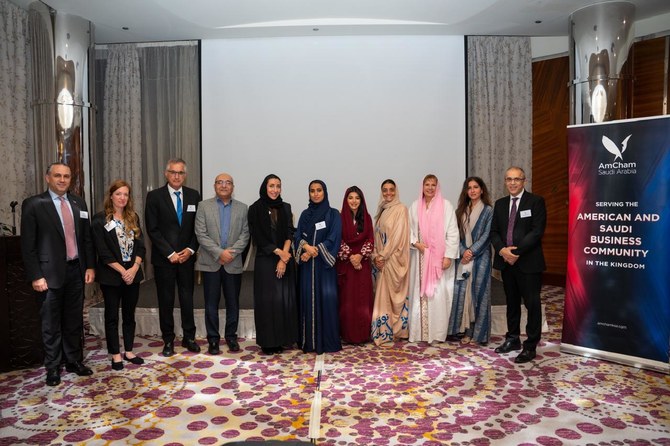JEDDAH: The Women in Business Committee of the American Chamber of Commerce in Saudi Arabia recently organized an event in Jeddah dedicated to honoring the remarkable achievements of female entrepreneurs in the Kingdom.
Maha Al-Juffali, founder, director, and supervising board member of the Help Center, highlighted her journey as an entrepreneur and the establishment of her NGO supporting individuals with intellectual disabilities in Saudi Arabia during a time when their needs were largely overlooked.
She said: “It demanded resourcefulness, innovation, and hands-on engagement at every turn. We overcame challenges, and with the support of my family and friends, we achieved significant progress in reshaping societal perceptions and providing essential support to individuals with disabilities.”
Al-Juffali highlighted the essential ingredients that empower women entrepreneurs to thrive, stating: “It’s about fostering a supportive ecosystem that nurtures their ambitions, providing access to mentorship, networks, and tailored financial instruments. Additionally, it involves changing the narrative and challenging outdated stereotypes by celebrating female role models and showcasing their achievements to inspire others.”
She also emphasized the significance of leveraging the digital revolution, stating: “It is crucial to embrace the opportunities presented by the digital revolution, which have opened unprecedented avenues for women entrepreneurs. Technology has become a great equalizer, enabling individuals with vision and determination to launch and scale businesses.”
The event featured an enlightening panel discussion on women’s empowerment and economic inclusion, moderated by Nora Al-Jindi, director of Dar Al-Hekma University’s marketing program.
Joining the panel were esteemed guests such as Marriam Mossalli, founder of Niche Arabia; Dania Shinkar, founder and creative director of Dania Shinkar Ltd; Jehan Alallah, IT manager at Amazon; and Mohammed Khan, associate professor in the marketing, entrepreneurship, and strategy department at Effat University.
The session delved into a range of topics, including effective scaling strategies, leveraging networks, and attracting investors, offering valuable insights from experienced business leaders. Moreover, the event served as a platform to showcase the exceptional talent, innovation, and resilience of female entrepreneurs who are playing a pivotal role in shaping the business landscape of Saudi Arabia.
Mossalli emphasized the importance of networking and relationships in the Saudi entrepreneurial landscape, saying: “Events like these facilitate networking and relationship-building. Despite the digital advancements and various platforms, it still boils down to who you know. I eagerly anticipate the next one.”
She highlighted the challenges of scaling a business, noting the psychological shift required to delegate responsibilities. “Scaling is the most challenging part, especially when your business is your baby. Delegating and letting go is a psychological change you have to get used to. It’s not about stepping down but about trusting others. Taking risks, like expanding Niche into large events, was scary but necessary. It's about pushing through fear and embracing competition.”
She also commended the government’s efforts in breaking down taboos around working women, calling it “a positive change from the top down.”
For aspiring entrepreneurs, Mossalli advised: “Immerse yourself in the industry you aim to enter. Work in various roles and gain a comprehensive understanding of all aspects of the business before embarking on their entrepreneurial journey.”
Shinkar said: “My involvement in the event centered around fashion female entrepreneurs. The event has been fantastic for networking and raising awareness about female entrepreneurship in Saudi Arabia. The recent reforms under Vision 2030 have provided significant opportunities and support for female entrepreneurs through initiatives, programs, and incubators. These have been invaluable in offering mentorship, funding, and access to trade shows and fashion exhibitions, helping us gain brand exposure regionally and internationally.”
Zeina Alnouri, AmCham Saudi Arabia Jeddah chapter coordinator, emphasized the importance of women supporting each other in business to pave the way for current and future success.
She said: “To excel as women in business, it’s important to work with one another to pave the path for those who are currently working towards their success and those who will come after them. We are proud to have brought together so many influential females from various fields this evening. It is inspiring to witness the accomplishments and experiences of each of our guests, and we eagerly anticipate hosting similar events of this caliber in the future.”
Attendees had the opportunity to engage in networking and knowledge-sharing activities, gaining valuable perspectives on the successes and challenges faced by women in business.

































